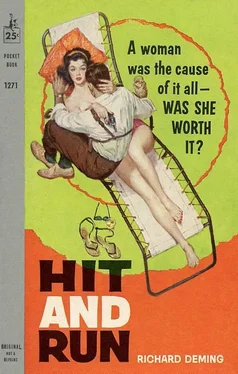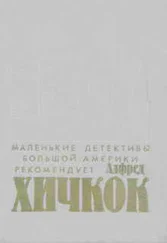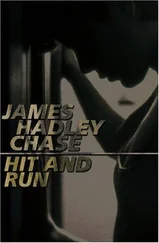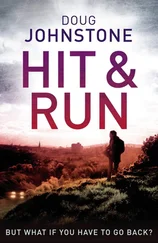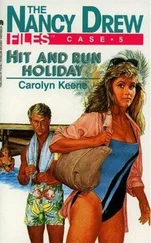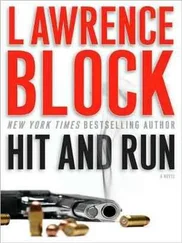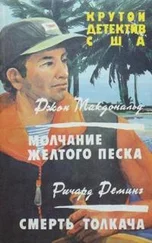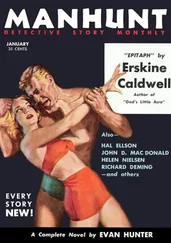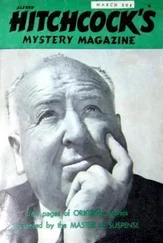The shock was not great because Calhoun had anticipated something on this order from the moment Helena said she would rather “show” him. Glancing about the room, he saw that the drapes were drawn so that they were safe from outside observation.
He said coldly, “It looks like you shot him from behind while he was mixing a drink. Right?”
She merely nodded.
“Why?”
“Because I was afraid he might give us away. He was in a panic when I told him Lawrence was dead.”
“Did he threaten to go to the police?”
She shook her head.
“What did he say?”
Helena shrugged slightly. “Nothing, really, except that I hadn’t any right to involve him in murder. And that he was through with me. It was the way he acted. He shook like a leaf.”
For a long time he looked at her. “Let me get this straight,” he said finally. “He didn’t threaten to expose us. He wasn’t going to the police. But just because he seemed to you like a poor security risk, you murdered him.”
“It wasn’t only that,” she said. “He refused to help any more. While I was explaining things to him, I suddenly remembered that Lawrence’s clothing was still hidden in the garage. I suggested we get it and burn it, but he point-blank refused.”
“That’s certainly a motive for murder,” Calhoun said sardonically.
She frowned slightly. “You make it sound worse than it was.”
“Then make it sound better.”
She made an impatient gesture. “What difference does it make now? It’s done. We have to dispose of the body.”
Again she looked at him expectantly, a curious brightness in her eyes. And suddenly he realized something he had been aware of subconsciously for some time but hadn’t brought to the front of his mind for examination.
Helena enjoyed watching him solve the problems brought on by murder.
It was a game to her, he knew with abrupt understanding, for the first time really knowing what went on behind that expressionless face.
He said, “What do you mean, we have to dispose of the body? I haven’t killed anybody.”
Her lip corners curved upward in a barely discernible smile. “I’m sure you wouldn’t want me caught, Barney. You can only be executed for one murder. So there wouldn’t be any point in not telling the police about Lawrence if I got caught for this one. Including how cleverly you got rid of the body.”
With a feeling of horror Calhoun looked off into the future, seeing himself disposing of corpse after corpse as Helena repeatedly indulged her newly discovered thrill.
With only one possible result. Nobody gets away with murder forever.
He knew what he had to do then.
For a moment he examined her moodily. Then he shrugged. “All right, Helena. We may as well start now. Get some rags.”
Obediently she went into the kitchen, and returned in a few moments with several large rags. Taking them from her, Calhoun said, “Lift his head a little. So I can spread rags under it.”
She turned her back to him, put both hands under the dead man’s shoulders, and tugged upward. Calhoun scooped up the pistol lying on the floor, raised it high overhead, and swung it down on top of her head with all his force. She dropped without a sound as the metal barrel crunched through her skull.
Staring down at her body sprawled across that of her former lover, Calhoun thought grimly that it wasn’t much harder to dispose of two bodies than it is to dispose of one.
Fortunately Buffalo, as well as Cleveland, was on Lake Erie.
Calhoun’s first act after the murder was to make sure all doors to the house were locked. Then he searched until he found Helena’s straw bag in an upstairs bedroom. It contained keys to the house, the garage, and her Buick. He took them all downstairs with him.
Quietly he let himself out the front door, locked it behind him, and climbed into his Plymouth, parked in front of the house. He drove it into the driveway without turning on lights, braked with his front bumper nearly touching the garage doors, then backed across the lawn until the rear of the car was next to the back-porch steps.
Getting out, he looked at the houses on each side. Both were a good hundred feet away, and the views from them were partially obstructed by trees. There was a full moon, but filmy clouds reduced its light to a dim glow, just sufficient for visibility at close quarters.
Calhoun unlocked his car trunk and contemplated its interior with an estimating eye. It seemed far too small to receive two bodies. After studying it, he unscrewed the gadget that held the spare tire in place and lifted out the tire. He put it on the floor of the rear seat of the club coupe.
Leaving the trunk lid standing open, Calhoun unlocked the back door of the house. He left that standing open, too. On his way through the kitchen he switched off the light; he didn’t want its glow outlining him for any possible onlookers when he came out the back door again.
In the front room he lifted Helena’s body off of Cushman’s and laid it to one side. His single blow had crushed the back of her head, but her thick hair had absorbed most of the blood. There hadn’t been much, for she had died instantly. Only a small rusty spot at the back marred the sleek black head.
In the process of moving her aside, the housecoat had come open and one sleeve had been pulled halfway down one arm. It would be unwieldy trying to carry her with the long garment flapping loose, Calhoun decided. He pulled it the rest of the way off, carried it upstairs, and hung it in her closet.
Downstairs again, Calhoun carefully wrapped Cushman’s battered head in one of the large rags Helena had brought from the kitchen. He noted with satisfaction that because of the body’s face-down position, no blood had got on the rug.
He heaved the corpse into his arms, and staggered through the house with it and down the back-porch steps. Rigor mortis had not yet begun to set in, and the body was totally limp. He had no great difficulty fitting it in a doubled-up position into the car trunk.
The only trouble was that, despite his forethought in removing the spare tire, Calhoun had left insufficient room for a second body.
Calhoun considered what to do. The spare tire in the back seat left no room there for a body. And he could hardly put Helena upright in the front seat next to him. If she had been dressed, she might appear to passers-by to be sleeping. But naked as she was, he wouldn’t get two blocks before some busybody would be calling the police.
He contemplated dressing her, then decided this would only involve more clothing to get rid of when he disposed of the bodies. It would be simpler to make two trips.
He locked the car trunk and the house’s back door, and climbed into the front seat. He drove out of the driveway without lights, switched them on as soon as he reached the street, and drove straight down Delaware Avenue. Twenty minutes later he parked in front of his flat.
It was now past eleven P.M., and Pearl Street was deserted. Leaving his apartment door wide open, he returned to the car and unlocked the trunk. After glancing both ways along the street, he lifted the lid, heaved Cushman’s body into his arms, and carried it inside at a staggering trot. Unceremoniously he dumped it on the front-room floor, immediately went out again and locked the door behind him.
By eleven thirty P.M. he was backing the Plymouth to the rear door of Helena’s house again.
Inside, he stared down at Helena’s body for a long time. She lay on her side in a natural sleeping position, her face no more expressionless in death than it had been in life. Calhoun experienced a moment of regret at the sight of her perfect body. Then he steeled himself with the thought of the nightmare his life would undoubtedly have become if he had allowed her to live. There had been no choice.
Читать дальше
